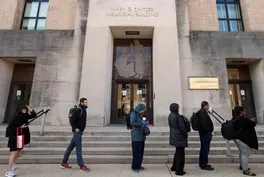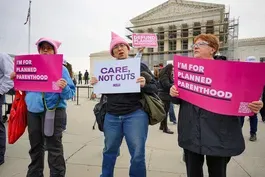
How private equity in health care is affecting patients
Clip: 4/2/2025 | 8m 20sVideo has Closed Captions
How private equity's increasing role in health care is affecting patients
Economics correspondent Paul Solman is exploring the impact on communities in Massachusetts after a private equity firm bought struggling hospitals. In his second report, he looks at how private equity's increasing role in health care is affecting patients.
Problems with Closed Captions? Closed Captioning Feedback
Problems with Closed Captions? Closed Captioning Feedback
Major corporate funding for the PBS News Hour is provided by BDO, BNSF, Consumer Cellular, American Cruise Lines, and Raymond James. Funding for the PBS NewsHour Weekend is provided by...

How private equity in health care is affecting patients
Clip: 4/2/2025 | 8m 20sVideo has Closed Captions
Economics correspondent Paul Solman is exploring the impact on communities in Massachusetts after a private equity firm bought struggling hospitals. In his second report, he looks at how private equity's increasing role in health care is affecting patients.
Problems with Closed Captions? Closed Captioning Feedback
How to Watch PBS News Hour
PBS News Hour is available to stream on pbs.org and the free PBS App, available on iPhone, Apple TV, Android TV, Android smartphones, Amazon Fire TV, Amazon Fire Tablet, Roku, Samsung Smart TV, and Vizio.
Providing Support for PBS.org
Learn Moreabout PBS online sponsorshipAMNA NAWAZ: Last night, economics correspondent Paul Solman reported on the impact in Massachusetts after a private equity firm bought several struggling hospitals there.
Tonight, Paul looks at the bigger picture, the effect of private equity investments on Americans' health care.
ELLEN MACINNIS, Nurse, St. Elizabeth's Medical Center: There's a bereavement box.
And some items are placed with the baby.
PAUL SOLMAN: Nurse Ellen MacInnis.
ELLEN MACINNIS: And the baby's remains, and that eventually goes to the morgue.
PAUL SOLMAN: She's talking about what happened at her hospital after purchase by a private equity firm Cerberus, which created a subsidiary, Steward Health Care, to run eight struggling Massachusetts hospitals.
ELLEN MACINNIS: Steward didn't have any bereavement boxes.
They didn't the vendor, so they weren't any.
So nurses were having to put babies' remains in banker's boxes and cardboard shipping boxes.
It only happened once or twice, and then nurses went out and bought the bereavement boxes themselves.
PAUL SOLMAN: Plus, 15 deaths were attributed to the care, or lack of it, in the hospitals, two now completely shut in the wake of the private equity purchase.
Moreover, it wasn't just in Massachusetts.
Steward bought 37 hospitals around the country.
And more than 450 hospitals nationwide have been taken over by private equity, as well as nursing homes, emergency rooms, doctor's practices, and air ambulances.
One analysis finds that private equity investors spent more than $200 billion on health care acquisitions in 2021 alone, and $1 trillion over the past decade.
STATE SEN. CINDY FRIEDMAN (D-MA): It's a real problem.
PAUL SOLMAN: And that problem says Cindy Friedman: STATE SEN. CINDY FRIEDMAN: Private equity is the complete opposite of the delivery of health care.
PAUL SOLMAN: State Senator Friedman has been trying to rein in private equity in Massachusetts through legislation.
STATE SEN. CINDY FRIEDMAN: Make money, leave, make it however you want, make it for people who are invested in making money, and then you have got health care, which is all about delivering care to people.
The cost is not the first thing.
The delivery care is the first thing.
And those two things do not mesh.
PAUL SOLMAN: But they are now joined at the hip, says economist Rosemary Batt.
ROSEMARY BATT, Cornell University: We're seeing a rise in financialization and the role of unregulated financial actors in Main Street companies because of the deregulation of the financial industry that took place over decades.
PAUL SOLMAN: And thus privatization, a lot of it by private equity.
ROSEMARY BATT: This has happened in many industries, but it is particularly serious when it has moved into social goods such as health care, where people's lives are at stake.
PAUL SOLMAN: So, an economic disaster?
Really?
RYAN MCDEVITT, Duke University: It was a struggling hospital system.
PAUL SOLMAN: Economist Ryan McDevitt, who's presented his work at private equity events, says health care in general and the Steward hospitals in particular were failing long before private equity got involved.
RYAN MCDEVITT: They were poorly performing.
Private equity tried to salvage it, didn't quite work, but I wouldn't say that's specific to private equity.
PAUL SOLMAN: As usual, private equity promised to invest to improve its purchases.
RYAN MCDEVITT: Health care is dysfunctional.
It's broken.
There's a lot of waste in the system.
If private equity can come in, reduce costs, increase profits, that should be a good thing.
PAUL SOLMAN: Should be, but is it?
Before I try to answer, here's a shot at explaining what private equity is, first, private, because, as with so-called hedge funds, there are few enough investors that the SEC doesn't regulate private equity firms.
What investors?
DR. ZIRUI SONG, Harvard Medical School: Well-known entities in our society, including pension funds, institutional endowments, as well as the wealthy individuals.
PAUL SOLMAN: MD Zirui Song of Harvard Medical School studies the industry.
He notes that most of the purchase price of a hospital or other health care entity is provided by debt owed to the lender like a bank.
That debt and the interest on it is then paid by the hospital or medical practice.
When this model first came in, in the 1980s, the idea was that it was the discipline of debt, force the acquired company to become more efficient, no?
DR. ZIRUI SONG: Indeed.
And not only that, it's also the addition of managerial expertise that private equity firms bring in to health care settings that may have lacked it.
PAUL SOLMAN: But as with hedge funds, private equity's main appeal to investors is the industry's outsized return rate, estimated at 13 percent a year for the past 25 years, by comparison, the stock market, as measured by the S&P 500, 8.6 percent a year.
Now, debt and expertise might result in more efficiency and profits, but so might cutting corners, supplies, staff, and using a tactic at the heart of almost every hospital buyout, selling off the real estate.
Again, economist Batt: ROSEMARY BATT: The private equity firm can buy out a hospital, quickly divide it into a property company and an operating company, sell off the property for millions, and immediately turn that into cash, which it gives back to itself and to its investors.
The hospitals are left not only with the debt from the buyout, but with these high rents that increase every year.
PAUL SOLMAN: So, now the key question, the results of private equity in health care.
Well, Dr. Song and associates have studied Medicare data of more than half-a-million patients in hospitals after private equity takeovers.
Their findings?
DR. ZIRUI SONG: On average, across the country, private equity acquisitions of hospitals have led to a roughly 25 percent increase in patient adverse events.
PAUL SOLMAN: Really?
Like what?
DR. ZIRUI SONG: This was driven by an increase in central line-associated bloodstream infections and an increase in patient falls, as well as doubling roughly of surgical side infections relative to a control group or comparison group of hospitals that looked like the private equity hospitals, but were not acquired by private equity firms.
PAUL SOLMAN: Meanwhile, in the Steward buyouts, CEO Ralph de la Torre himself took out at least $250 million, according to a Wall Street Journal investigation.
Cerberus, the initial private equity buyer, blames de la Torre, but it earned $800 million in profit on a $246 million investment when it sold at stake 11 years after purchase.
So isn't this an overall indictment of private equity's involvement in health care?
RYAN MCDEVITT: Absolutely, these antidotes are concerning.
PAUL SOLMAN: Again, researcher Ryan McDevitt of Duke.
RYAN MCDEVITT: But what I'm trying to convey as an economist and academic is that we have to move beyond these anecdotes.
Is this happening systematically because of private equity?
I don't think that's clear at all.
What stood out to me is, in that same study, what was buried was that death rates actually fell more than the adverse events went up.
PAUL SOLMAN: He's referring to Dr. Song's study, but, reading it, the death rates only fell for the first 30 days, not after.
And, crucially, Song's study compared private equity hospitals to random equivalents.
The outcomes at the private equity hospitals were noticeably worse.
Dr. Song's takeaway?
DR. ZIRUI SONG: Although it remains true that in certain instances, private equity financing can turn around a struggling health care provider, to date, on average, that is an exception, rather than the rule.
PAUL SOLMAN: And that would jibe with the complaint we heard time and again.
As nurse Ellen MacInnis put it: ELLEN MACINNIS: It has to do with what happens to the money.
Whether it goes to an account in the Caymans or it goes into Ralph de la Torre's pocket, it doesn't matter.
The money that should be there to take care of these patients is not.
PAUL SOLMAN: Not much of the time, it would seem.
For the "PBS News Hour," Paul Solman.
Cuts will grind HHS work to a halt, former secretary says
Video has Closed Captions
Important HHS services 'will grind to a halt' with cuts, former Secretary Sebelius says (8m 35s)
How Trump's tariffs could shake up U.S. and global economies
Video has Closed Captions
How Trump's sweeping new tariffs could shake up U.S. and global economies (6m 46s)
News Wrap: Myanmar earthquake death toll tops 3,000
Video has Closed Captions
News Wrap: Myanmar earthquake death toll tops 3,000 as civil war hampers relief efforts (6m 45s)
Supreme Court hears Planned Parenthood Medicaid funding case
Video has Closed Captions
Supreme Court case could decide if states can block Medicaid funding to Planned Parenthood (5m 39s)
West Philadelphia uses art to confront neighborhood problems
Video has Closed Captions
West Philadelphia uses art to confront neighborhood problems and threats to democracy (7m 4s)
What Florida and Wisconsin elections tell us about voters
Video has Closed Captions
What election results in Wisconsin and Florida tell us about voter sentiment (8m 33s)
Providing Support for PBS.org
Learn Moreabout PBS online sponsorshipMajor corporate funding for the PBS News Hour is provided by BDO, BNSF, Consumer Cellular, American Cruise Lines, and Raymond James. Funding for the PBS NewsHour Weekend is provided by...

















